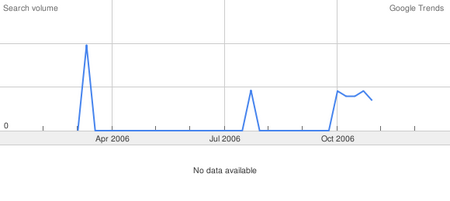
OpenID is a lightweight, decentralized identity system that has been gaining prominence. I expect this upcoming year to be a big year for OpenID — and not just because of the Google trend chart with the recent uptake in search query share.
OpenID is an identity system that allows you to have one username and one password for multiple sites. Your username is an URL. The password is whatever you choose (and like all paswords you should keep it secret). There are several different configurations that you can use to have an OpenID
- You can use an OpenID service provider and use the provided URL on their domain (e.g. yourname.vox.com)
- You can run your own OpenID server on your own server with your own domain (e.g. yourname.com)
- You can use a hosted OpenID service with your own domain (e.g. yourname.com). Learn how for your site or blog.)

Lately there have been a plethora of OpenID services launching. All users of SixApart‘s Vox and LiveJournal users automatically have OpenIDs. If you want to use a hosted service JanRain‘s MyOpenID just launched with an affiliate service (for companies that want to support OpenID, but don’t want to maintain their own server). They also launched with a free CAPTCHA webservice called BotBouncer aimed at servicing OpenID-enabled sites. You can find other hosted services as well as your identity servers on the OpenID Wiki
I know it sounds interesting, but what good is it to you now? OpenID is currently accepted by around 500 sites including Vox, LiveJournal, and Zooomr. Sxip is now supporting OpenID in their identity applications. Expect more Open Source applications to begin including it in an attempt to claim the I Want My OpenID Bounty.Yahooligan Simon Willison, co-creator of the Python web application framework Django, has been tagging all of the sites that accept OpenID with the tag OpenIDConsumer.
Identity is one of the last pieces of the Web 2.0 puzzle to become decentralized and fully owned by the user. Up till now we’ve had to rely on sites to control our identity; now with personal sites (mostly blogs) becoming common there is finally a mechanism for us to take our identities into our own hands.
Kaliya Hamlin, Identity Woman, will be doing a session on User-centric Identity Systems (including OpenID) at the Web 2.0 Expo this April.

